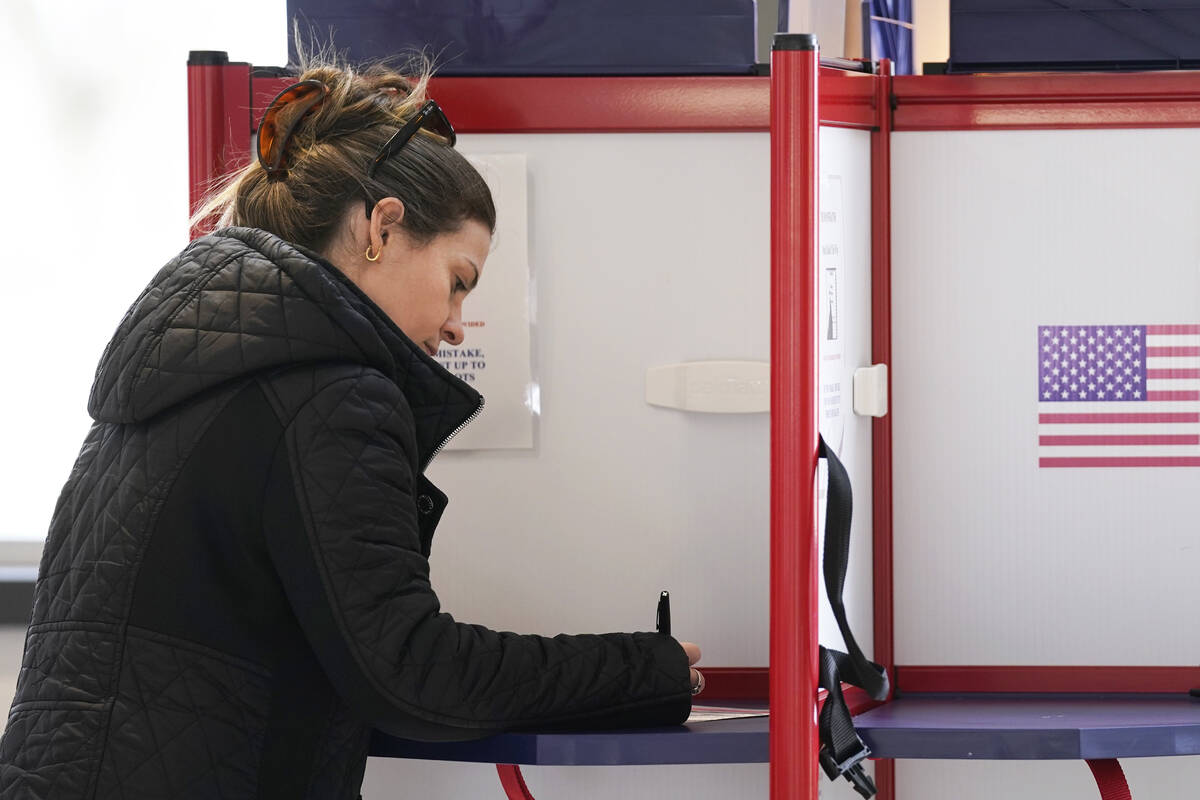Nevada part of lawsuit to block Trump’s election order, saying it violates the Constitution
Democratic officials in 19 states — including Nevada Secretary of State Francisco Aguilar and Attorney General Aaron Ford — filed a lawsuit Thursday against President Donald Trump’s attempt to reshape elections across the U.S., calling it an unconstitutional invasion of states’ clear authority to run their own elections.
The lawsuit is the fourth against the executive order issued just a week ago. It seeks to block key aspects of it, including new requirements that people provide documentary proof of citizenship when registering to vote and a demand that all mail ballots be received by Election Day.
Ford, a Democrat, said the president’s order was “blackmailing states” with its threat to remove election security unless they comply. During a press conference with California Attorney General Rob Bonta detailing the complaint, Ford said he and the secretary of state work closely to follow the state’s election laws.
“While this order is on its face unconstitutional and illegal, it is also unnecessary,” Ford said. “It is not needed. Every state has safeguards in place. Every state takes it seriously. Every state has a vested interest in seeing this process play out with care and with consideration and with accuracy. To insinuate otherwise and to say to them, ‘impose restrictions’ based on these insinuations is political gamesmanship.”
Secretary of State Francisco Aguilar said he saw the executive order as “an unlawful attempt to grab power from both the states and Congress.”
“We have proven time and time again that Nevada runs some of the most secure, transparent and accessible elections in the country,” Aguilar said in a press release. “There is no lawful basis for these attempts to force Nevada to change its policy. Even worse, the order is backed by threats to take away funding for election security and integrity; this is clearly not what the founders intended for our democracy.”
Harrison Fields, a spokesperson for the White House, similarly dismissed the lawsuit as political.
“The Democrats continue to show their disdain for the Constitution and it continues to show in their insane objections to the President’s commonsense executive actions to require proof of U.S. citizenship in an effort to protect the integrity of American elections,” Fields said in an email Friday. “The Trump administration is standing up for free, fair, and honest elections and asking this basic question is essential to our Constitutional Republic.”
Ford conceded that Nevada voters approved a voter ID requirement during the 2024 election, so this may be one of importance to many of his constituents. (The question will go to voters again in 2026 because it amends the Nevada Constitution.) But he said this lawsuit focuses on calling out the rationality for sweeping election changes.
“When they when people claim that there’s voter fraud that’s widespread, that requires us to institute voter ID to cut back on that, then the question becomes: ‘prove it,’” Ford said. “Because it makes sense rationally, but when they go to court, they can’t prove it.”
Trump’s election order
Trump’s order said the U.S. has failed “to enforce basic and necessary election protection.” Election officials have said recent elections have been among the most secure in U.S. history. There has been no indication of any widespread fraud, including when Trump lost to Democrat Joe Biden in 2020.
The order is the culmination of Trump’s longstanding complaints about how U.S. elections are run. After his first win in 2016, Trump falsely claimed his popular vote total would have been much higher if not for “millions of people who voted illegally.” In 2020, Trump blamed a “rigged” election for his loss and falsely claimed widespread voter fraud and manipulation of voting machines.
Trump has argued his order secures the vote against illegal voting by noncitizens, though multiple studies and investigations in the states have shown that it’s rare.
It has received praise from the top election officials in some Republican states who say it could inhibit instances of voter fraud and will give them access to federal data to better maintain their voter rolls.
The order also requires states to exclude any mail-in or absentee ballots received after Election Day, and puts states’ federal funding at risk if election officials don’t comply. Some states count ballots as long as they are postmarked by Election Day or allow voters to correct minor errors on their ballots.
Forcing states to change, the suit says, would violate the broad authority the Constitution gives states to set their own election rules. It says they decide the “times, places and manner” of how elections are run.
Congress has the power to “make or alter” election regulations, at least for federal office, but the Constitution doesn’t mention any presidential authority over election administration.
The lawsuit was filed in U.S. District Court in Massachusetts. Other lawsuits filed over the order argue it could disenfranchise voters because millions of eligible voting-age Americans do not have the proper documents readily available. People are already required to attest to being citizens, under penalty of perjury, in order to vote.
Under the order, documents acceptable to prove citizenship would be a U.S. passport, a REAL ID-compliant driver’s license that “indicates the applicant is a citizen” and a valid photo ID as long as it is presented with proof of citizenship.
Democrats argue that millions of Americans do not have easy access to their birth certificates, about half don’t have a U.S. passport, and married women would need multiple documents if they had changed their name. That was a complication for some women during recent town elections in New Hampshire, the first ones held under a new state law requiring proof of citizenship to register.
Not all REAL ID-compliant driver’s licenses designate U.S. citizenship.
Cassidy reported from Atlanta. Las Vegas Review-Journal reporter McKenna Ross contributed to this report.




















